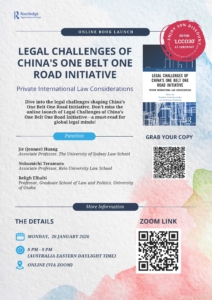Views
XLK v XLJ: Comity Beyond the Child Abduction Convention
By Haoxiang Ruan, PhD candidate at Hitotsubashi University (Tokyo, Japan). Haoxiang Ruan consistently maintains an interest in international family law, which led him to undertake the 2024-2025 academic stay at Kyoto University (Kyoto, Japan).
From the perspective of state participation, the Convention of 25 October 1980 on the Civil Aspects of International Child Abduction (the “Child Abduction Convention”) stands as one of the most successful instruments of the Hague Conference on Private International Law (HCCH), boasting 103 Contracting Parties to date. This widespread adherence is largely driven by the pervasive—and increasingly difficult-to-ignore—problem of international child abduction, which affects even non-Contracting States. China, a populous country deeply engaged in globalization, exemplifies this reality. A recent custody ruling in Singapore concerned a child who had been brought to the country by his father in breach of an order issued by a Chinese court—an incident underscoring how cross-border family disputes transcend the formal boundaries of the Convention.
Conflict of laws in the South African courts: a recent missed opportunity
Posted on behalf of Jason Mitchell, barrister at Maitland Chambers in London and at Group 621 in Johannesburg.
It’s rare for conflict of laws to come up in South African courts (with the notable exception of the Turkcell litigation from earlier this year; see the summary on this site at https://conflictoflaws.net/2025/south-africa-grapples-with-the-act-of-state-doctrine-and-choice-of-law-in-delict/).
Reciprocity and the Enforcement of Foreign Judgments in Egypt – A Critical Assessment of a Recent Supreme Court Decision

I. Introduction
Reciprocity is probably one of the most controversial requirements in the field of the recognition and enforcement of foreign judgments. While its legitimacy appears to be on the wane (see Béligh Elbalti, “Reciprocity and the Recognition and Enforcement of Foreign Judgments: A Lot of Bark but Not Much Bite,” 13 JPIL 1 (2017) 184), reciprocity can still strike hard – particularly when it is applied loosely and without sufficient consideration.
The case presented here, decided by the Egyptian Supreme Court (Appeal No. 11434 of 21 June 2025), provides a good illustration. Despite the Court’s well-established case law imposing certain restrictions on the use of the reciprocity requirement, this recent judgment shows that, when not applied with the necessary rigor, reciprocity can still produce significant effects that undermine the legitimate expectations of the parties.
News
Online Book Launch – Legal Challenges of China’s One Belt One Road Initiative: Private International Law Considerations
Following the successful release of Legal Challenges of China’s One Belt One Road Initiative: Private International Law Considerations late last year, as previously announced on this blog, co-editors Dr Poomintr Sooksripaisarnkit (University of Tasmania) and Dr Sai Ramani Gariimella (South Asian University) are pleased to invite you to an upcoming online book launch.
This virtual event will feature insights from three distinguished contributors:
- Dr Jie (Jeanne) Huang (University of Sydney)
- Dr Nobumichi Teramura (Keio University Law School)
- Professor Beligh Elbalti (The University of Osaka)
Presentations will be followed by a moderated Q & A and discussion session.
This event is open to the public; please refer to the attached flyer to scan the QR Code for Zoom access.

Supreme Court of Canada to Hear Jurisdiction Appeal
Canada’s highest court does not grant leave to appeal in many cases involving private international law. In November 2025 it granted leave to appeal from NHK Spring Co., Ltd. v Cheung, 2024 BCCA 236, in which the British Columbia Court of Appeal agreed with the court below in holding that it had jurisdiction to hear a price fixing class action. The action is interesting because it involves what could be described as a “foreign” conspiracy that had effects within Canada.
The defendants are Japanese entities and the claim alleges that they conspired to fix the price of “suspension assemblies” which are a component of hard disk drives which are in turn a component of things like computers. The claim alleges that Canadians purchased products that contained these assemblies and because of the price fixing they paid more than they otherwise would have done.
PAX Moot – Deadline for registration is Friday 16 January 2026 at 23:59 CET
The PAX Moot 2026 Vladimir Koutikov Round is well underway. The case was published on 13 October 2025 and is available here. The deadline for registration is 16 January 2026 at 23:59 CET.
Save the date: The oral rounds will take place from 15 to 17 April 2026 in Sofia, Bulgaria.


